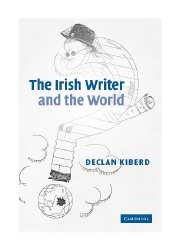Book contents
- Frontmatter
- Contents
- Acknowledgements
- A note on the text
- 1 Introduction
- 2 The fall of the Stage Irishman (1979)
- 3 Storytelling: the Gaelic tradition (1978)
- 4 Writers in quarantine? The case for Irish Studies (1979)
- 5 Synge, Yeats and bardic poetry (2002)
- 6 George Moore's Gaelic lawn party (1979)
- 7 The flowering tree: modern poetry in Irish (1989)
- 8 On national culture (2001)
- 9 White skins, black masks: Celticism and Négritude (1996)
- 10 From nationalism to liberation (1997)
- 11 The war against the past (1988)
- 12 The Elephant of Revolutionary Forgetfulness (1991)
- 13 Reinventing England (1999)
- 14 Museums and learning (2003)
- 15 Joyce's Ellmann, Ellmann's Joyce (1999)
- 16 Multiculturalism and artistic freedom: the strange death of Liberal Europe (1993)
- 17 The Celtic Tiger: a cultural history (2003)
- 18 The city in Irish culture (2002)
- 19 Strangers in their own country: multiculturalism in Ireland (2001)
- Index
- References
12 - The Elephant of Revolutionary Forgetfulness (1991)
Published online by Cambridge University Press: 22 September 2009
- Frontmatter
- Contents
- Acknowledgements
- A note on the text
- 1 Introduction
- 2 The fall of the Stage Irishman (1979)
- 3 Storytelling: the Gaelic tradition (1978)
- 4 Writers in quarantine? The case for Irish Studies (1979)
- 5 Synge, Yeats and bardic poetry (2002)
- 6 George Moore's Gaelic lawn party (1979)
- 7 The flowering tree: modern poetry in Irish (1989)
- 8 On national culture (2001)
- 9 White skins, black masks: Celticism and Négritude (1996)
- 10 From nationalism to liberation (1997)
- 11 The war against the past (1988)
- 12 The Elephant of Revolutionary Forgetfulness (1991)
- 13 Reinventing England (1999)
- 14 Museums and learning (2003)
- 15 Joyce's Ellmann, Ellmann's Joyce (1999)
- 16 Multiculturalism and artistic freedom: the strange death of Liberal Europe (1993)
- 17 The Celtic Tiger: a cultural history (2003)
- 18 The city in Irish culture (2002)
- 19 Strangers in their own country: multiculturalism in Ireland (2001)
- Index
- References
Summary
1991: WHO FEARS TO SPEAK OF EASTER WEEK?
On Easter Sunday 1991, the leaders of the Irish Republic gathered at the General Post Office in Dublin to remember the event that led to their state's foundation. The ceremony was spare. Five surviving veterans of the Rising attended (a sixth stayed away as a protest at what he saw as the current politicians' betrayal of the ideals of 1916). A revelation in the Irish Press during the previous week that no special travel arrangements had been made for the veterans, some of whom were infirm, had the desired effect. The former rebels were given seats near to state dignitaries.
Later, the Taoiseach, Charles J. Haughey, was featured in an interview on the six o'clock news. The reporter did not ask whether such a brief, sheepish ceremony was an appropriate way to mark the seventy-fifth anniversary, or whether it might be contrasted unfavourably with 4 July celebrations in the United States or Bastille Day in France. What transpired was far more interesting than that: the leader of a sovereign state was asked why he was holding a ceremony at all. If privately he considered the question insulting or stupid, he concealed his feelings with great skill and gave a civil answer. The reporter suggested that IRA terrorists might derive comfort and succour from the festivities. Mr Haughey quietly denied this.
- Type
- Chapter
- Information
- The Irish Writer and the World , pp. 191 - 207Publisher: Cambridge University PressPrint publication year: 2005

